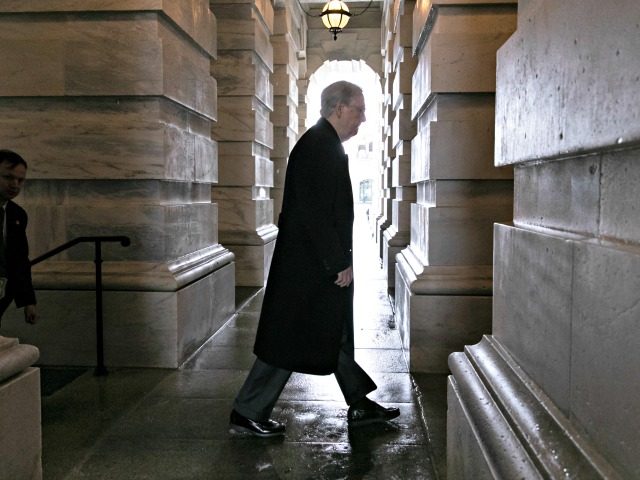The Senate advanced the House-passed spending bill that contains $5.7 billion in wall funding on Friday.
The Senate passed a motion to proceed on the House-passed continuing resolution (CR), 48-47, that includes $5.7 billion in border wall funding, which will put the spending bill to a full floor vote soon. Vice President Mike Pence broke the tie on the motion to proceed, which will allow the Senate to vote on the legislation.
Senate Majority Leader Mitch McConnell (R-KY) said on the Senate floor Friday:
My colleagues, here’s where we are. It’s now clear that Republicans have enough votes to proceed to the pending legislation on government funding, disaster relief, and border security. Within the Republican conference, there is strong support for the president’s reasonable request for more resources to tackle the urgent situation on our southern border.
Republicans support the House-passed bill which includes additional border security funding. However, we are also eager to complete the remaining appropriations bills which the Senate has already passed. Since any eventual solution will require 60 votes here in the Senate, it’s been clear that from the beginning that two things are necessary: The support from enough Senate Democrats to pass the proposal at 60, and a presidential signature.
As a result, the Senate has voted to proceed to the legislation before us in order to preserve maximum flexibility for productive conversations to continue between the White House and our Democratic colleagues. I hope Senate Democrats will work with the White House on an agreement that can pass both houses of Congress and receive the president’s signature. So colleagues, when an agreement is reached, it will receive a vote here on the Senate floor.
Leader McConnell has moved to concur in the House amendment to the Senate amendment to the House amendment to the Senate amendment to H.R.695, the legislative vehicle for the CR pic.twitter.com/4ocuWd5vas
— Senate Cloakroom (@SenateCloakroom) December 21, 2018
The Senate motion to proceed on the House-passed CR serves as one of the longest motion to proceed votes in modern Senate history, which lasted five hours and 18 minutes. The next longest motion to proceed was on the Economic Recovery Act in February 2009.
Today’s motion to proceed vote, which began at 12:31pm and ended at 5:49pm (5 hours and 18 minutes), became the longest vote in modern Senate history, beating out BY ONE MINUTE a vote on the Economic Recovery Act in February 2009 which lasted 5 hours and 17 minutes.
— Frank Thorp V (@frankthorp) December 21, 2018
The motion to proceed vote took over five hours because many senators left for their home states after the Senate initially passed a CR with no wall funding on Tuesday. Many pundits thought the Senate CR with wall funding would be in jeopardy after Sen. Jeff Flake (R-AZ) voted against the motion, and more-conservative Democrats such as Sen. Joe Manchin (D-WV) voted against the motion.
Sen. Doug Jones (D-AL), a vulnerable Senate Democrat in the 2020 elections, voted for the motion to proceed.
Sens. Flake and Bob Corker (R-TN) said that they agreed to vote yes on the motion to proceed after they received the understanding that they could attach amendments to the bill. Flake said, “There is no path forward for the House bill that contains wall funding.”
Sen. Flake tweeted on Friday:
Just voted to keep govt funding negotiations open with leaders of both parties agreeing not to call for additional procedural or test votes until a final deal is reached between House, Senate and WHite House.
— Jeff Flake (@JeffFlake) December 21, 2018
Sen. Corker said that he wants no more votes “until a global agreement is reached.”
Corker says no more votes “until a global agreement is reached”
— Chad Pergram (@ChadPergram) December 21, 2018
President Donald Trump urged Senate Majority Leader Mitch McConnell (R-KY) to drop the 60-vote threshold for passing legislation in the Senate so that Republicans could pass a CR that contains border wall funding.
“Mitch, use the Nuclear Option and get it done!” Trump wrote on Twitter. “Our Country is counting on you!”
McConnell’s spokesman, David Popp, released a statement on Friday, contending that he will not drop the filibuster. Popp said:
The Leader has said for years that the votes are not there in the Conference to use the nuclear option. Just this morning, several senators put out statements confirming their opposition, and confirming that there is not a majority in the conference to go down that road.
Retiring Sens. Jeff Flake (R-AZ), Orrin Hatch (R-UT), and Lamar Alexander (R-TN) all released statements on Friday, opposing the nuclear option to fund the wall.
“We have rules to follow. I want to put a stop to this practice of the Senate breaking its rules to change its rules,” Alexander said. “I will not vote to turn the Senate into a rule-breaking institution, and I hope that my colleagues will not.”
Conservative Review senior editor Daniel Horowitz suggested that Republicans can use arcane parliamentary procedures in the Senate to pass border wall funding with a simple majority, skipping the option of entirely “going nuclear.”
Horowitz also said that President Trump’s entire presidency remains on the line with this wall funding battle.
“Trump must remember that his entire presidency is on the line. This is his moment,” Horowitz charged. “He must use the bully pulpit and every constitutional tool at his disposal to finally force a national debate over the integrity of our own borders.”

COMMENTS
Please let us know if you're having issues with commenting.